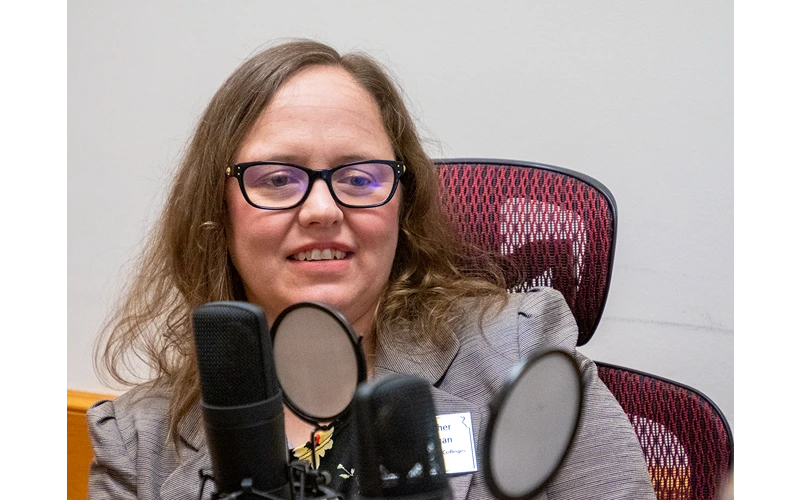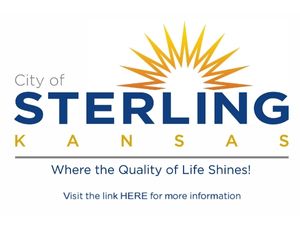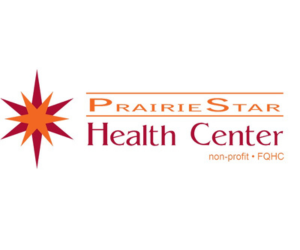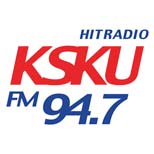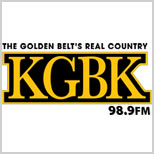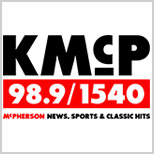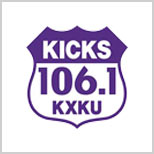Legislators defend reliance on out-of-state athletes to build competitive teams
By Tim Carpenter, Kansas Reflector
TOPEKA, Kan. — A Kansas House Republican who requested a state audit of community college spending on sports said Wednesday the report fell short of identifying how much scholarship aid was granted student athletes from outside the county responsible for assessing property taxes to fund the college.
Augusta Rep. Kristey Williams responded to public release of the report by the Legislature’s auditing division by complaining the document didn’t delve sufficiently into questions about allocation of community college sports scholarships to people who grew up outside the county, region, state or country.
“My goal in requesting this audit was to find out exactly where students were from,” Williams said. “Community colleges are heavily funded by property tax, which is a huge burden on 19 counties that their surrounding counties do not pay for.”
Kansas operates 19 community colleges, but auditors concentrated the analysis on the Garden City, Hutchinson and Butler community colleges. About four of every five students enrolled at community college in Kansas were from this state, but most athletes at the three community colleges taking part in the audit weren’t from Kansas. Likewise, auditors said, most athletic scholarships at the three community colleges were awarded to students not raised in Kansas.
Mohri Exline, an auditor with the Legislative Division of Post Audit, said the three community colleges examined in detail spent an average of $2.8 million annually in student tuition and fees, public sources of funding, and other income to support athletic department operations from 2018 to 2022. Most of that category of athletic department spending was for coaching salaries, equipment and transportation, she said.
The Butler, Hutchinson and Garden City community colleges spent an average of $1.2 million annually on sports scholarships during the five-year period.
Exline said the audit team concluded most Kansas Jayhawk Community College Conference athletes were from outside Kansas and most sports scholarships awarded at those schools were to students from other states or countries.
‘Extra excitement’
Heather Morgan, executive director of the Kansas Community College Association, said the state’s community colleges placed an emphasis on recruiting students in their geographic region or the state. She said it was in the best financial interests of the 19 community colleges to recruit in-state students because the colleges received state aid for each of those students.
“Athletics bring an extra excitement to our campuses, frankly, and it attracts students (and) attracts people from out of state who are going to stay here after the fact,” Morgan said.
KJCCC colleges were distinct government entities governed by locally elected trustees and separate from the public universities under oversight of the Kansas Board of Regents. Each of the 19 community colleges in Kansas operated athletics programs. Auditors reported college officials said the sports created educational opportunities for students and built a sense of comradery and belonging among the student body.
Kansas law prohibits community colleges from using federal, state or county funds for athletic scholarships. State auditors said Butler and Garden City community colleges relied on student fees to pay all or almost all of athletic scholarships. Hutchinson Community College depended on student fees for a large portion of those scholarships, but incorporated revenue from ticket sales and concessions.
In terms of the audited colleges, the report said, 2,252 students participated in football, volleyball, softball, baseball, basketball or soccer from 2018 to 2022. About 31% of those athletes were Kansans, while 60% came from another state and 8% from another country. The colleges said 87% of their students were from Kansas during 2022.
‘Terribly sad’
Williams said the majority of athletes at Butler Community College weren’t local. She said her brother wouldn’t have had the opportunity to play football at Butler had coaches in the past focused so much on recruiting athletes from elsewhere.
“For me,” she said, “that’s terribly sad because you just don’t have the community support or pride.”
Sen. Ethan Corson, a Johnson County member of the Legislature’s audit committee and a former baseball scholarship athlete at Garden City Community College, said he rejected the argument college students and community members weren’t drawn to sports events if rosters weren’t full of players who grew up nearby. He said the six national championships won by the Butler football teams were a big deal for fans.
“That’s really appealing to students, the community,” Corson said. “I would just question how much interest there would be from the community if you had an all in-district football team that was losing every single game.”
Rep. Shannon Francis, a graduate of Seward County Community College and a Republican from Liberal in southwest Kansas, said the new audit illustrated the significance of local control by community college trustees.
He said Seward County made a decision in the past to moderate expenditures on athletics and suffered through an era in which the college’s teams weren’t competitive.
“It was disastrous,” he said. “It wasn’t good at all for the institution.”














